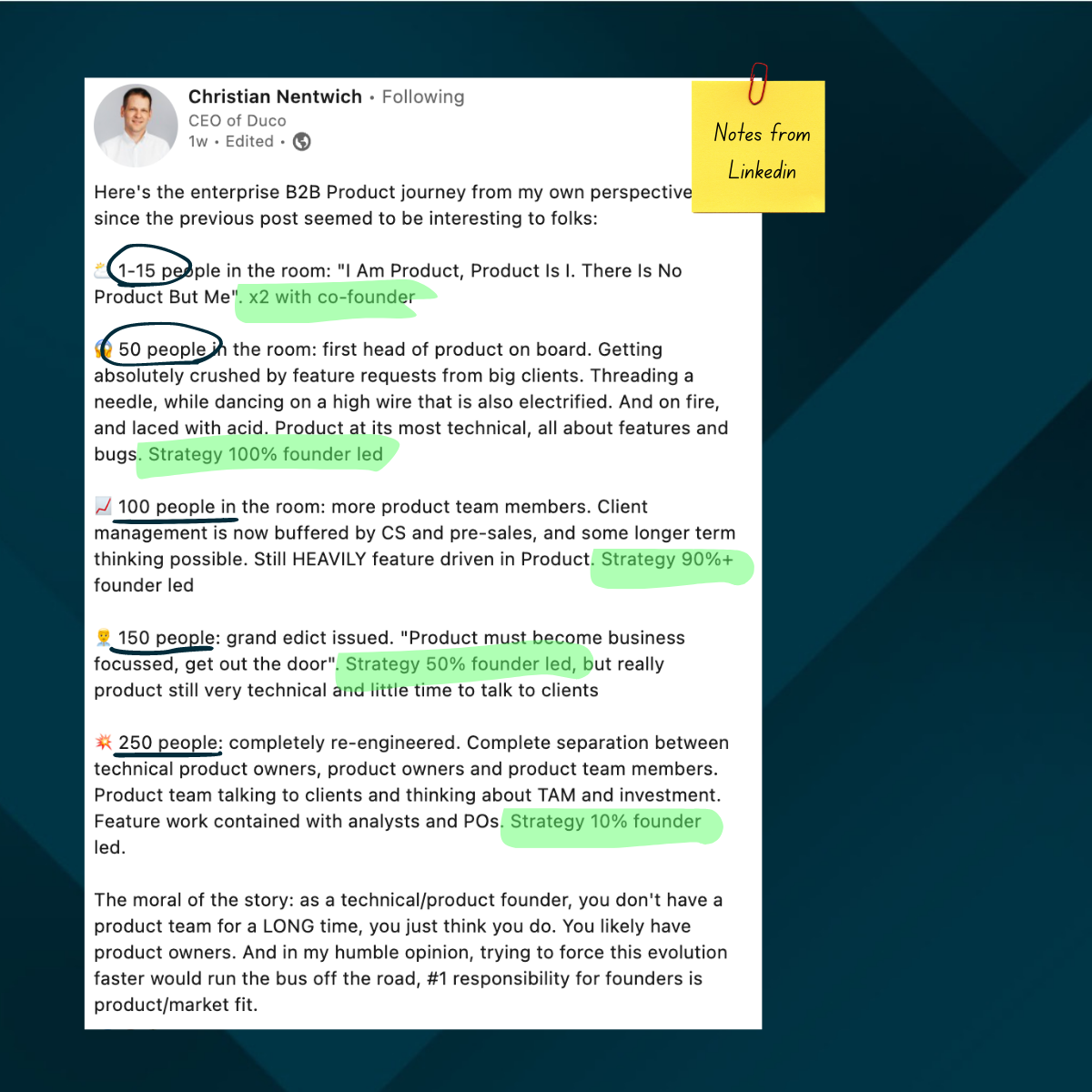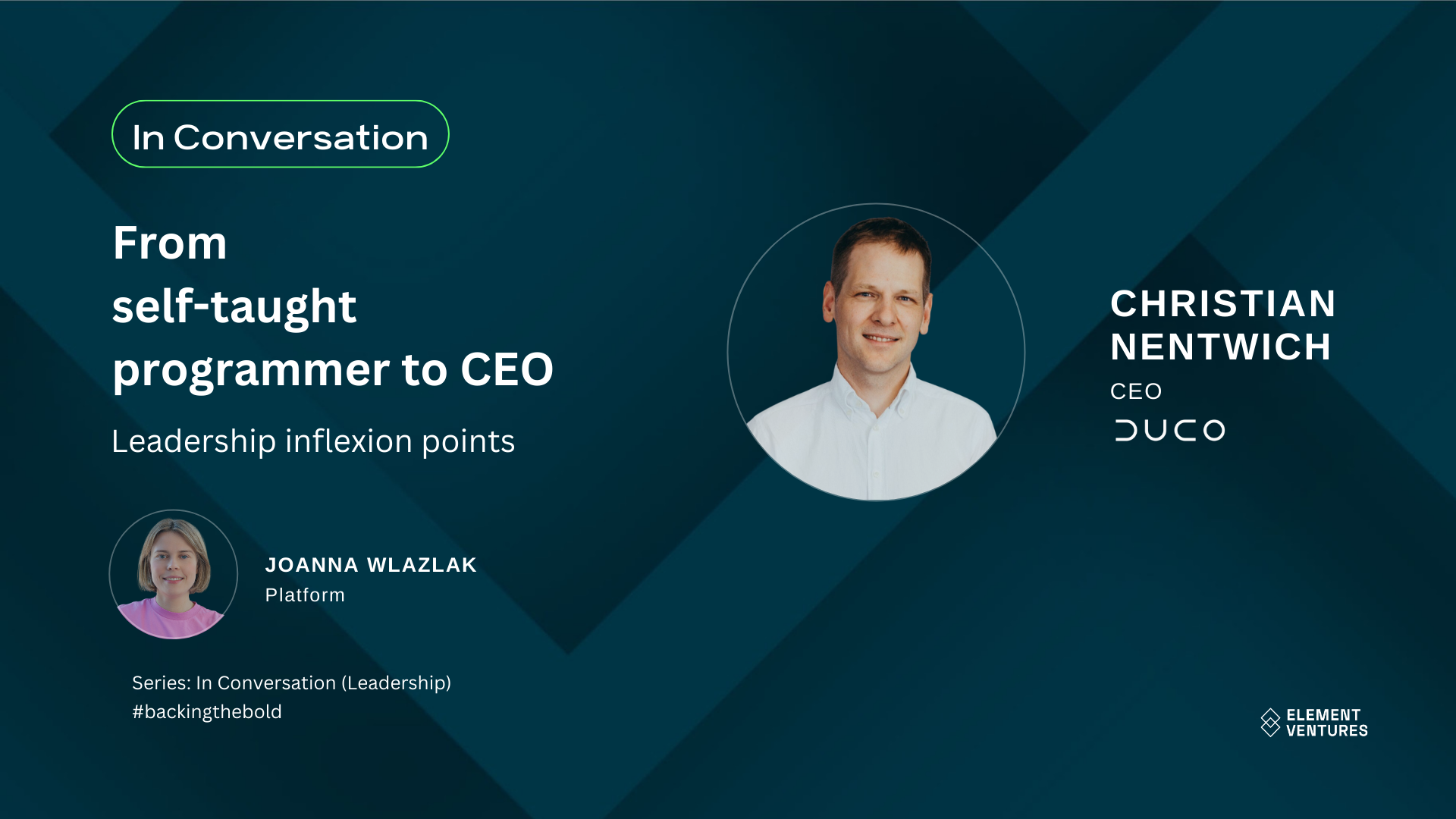CEOs must evolve
From the moment he founded Duco, Christian began a personal journey. In the early stages of the business, he recognised that he was CEO in name only, but his role grew as the company did. The most important journey for Christian was that of the product market fit, as he looked to identify a market that would set the organisation up for the future. But what did his personal journey teach him?
The biggest takeaway was the need to constantly reinvent yourself and the team around you. You need to take action on the management structure and make changes when something can be improved upon, to install best thinking and behaviours for the business.
Growth will set the heartbeat of your company
We might be stating the obvious that as a company grows, the needs of the business have to change with it. The first major inflection point for Christian came when Duco reached 40 employees, and he recalled that there was no key strategy in place to support a business of its size. At that time, Christian was still taking on multiple roles at once. So, he had to spend more time communicating and writing down his strategy so that this could be replicated across the business.
But he believes these inflection points are reached when successful business leaders learn and change themselves, otherwise they become a drag on the company. These are, he admits, often big and scary moments, and not recognising them fast enough could lead to problems.

TLDR version of different product development stages
When the second major inflection point came, Duco was a Series B investment with 120 people, and Christian was much better prepared. Despite some natural feelings of uncertainty about what comes next, Christian knew what he needed to do to push forward. He recognised he needed to repeat the same processes of redefining his own role, and the roles and capabilities of the management team, including changes in the management team itself.
Once the firm was better capitalised, Christian was able to support Duco’s growth and keep his employees looking ahead.
The value of land and expand
From day one, Christian built Duco with tier-one enterprise clients in mind. He wasn’t aware that it would appeal to smaller banks, but he soon learned how much they would value a SaaS platform that can go live in 24 hours. Duco took on multiple competitors in solving the huge data reconciliation problem in the financial services industry, differentiating itself through a strategy of ‘land and expand’ which has led Duco to have a 120% net retention for five years in a row.
Land and expand is the process by which Christian and his team consistently find the most urgent thing that is burning a place down. Then they sell it. This affects how you approach conversations with clients, as Christian referenced how it is easier to grow $700k in revenue into $1.5M by showing you can solve more problems, rather than creating a net new enterprise deal. And ultimately, Duco believes in the product they sell being so successful that people will want to buy more of it.
Capture real metrics
Being organised at the early stages of a company will produce business benefits and key learnings for years to come. Christian told us how he regrets that he never correctly captured Duco’s clients’ achievements through using the Duco platform, i.e., the outcomes they created. He says that initially they did not capture this information, and afterwards it was difficult to go back and say, “How much did you automate and what was your ROI?”
When growing a business, he believes it is important to address your internal KPIs so you can understand how you are meeting your success criteria and utilise this for future growth. This will be helpful years down the line when you do not need to reverse-engineer this information.
Being organised at the early stages of a company will produce business benefits and key learnings for years to come.
The importance of a good network
Christian has always valued his relationships with non-executive directors. While he will always have intelligent and friendly investors on their board to fall upon, there is a limit to the types of conversation that can be had here. But with his non-execs, Christian is able to have far more open conversations that can be valuable for Duco to operate without constraint.
One of the most important non-execs for Christian has been Cristobal Conde, who was open from the start in that he would be completely aligned with Duco, but that he was not only an investor, but was really joining because of Christian. This was liberating for a CEO like Christian, who understood the importance of voicing things and making it clear what the relationship is.
Another valuable tool for Christian is his network of CEOs. This was built from the connections that Christian made during the ‘Future 50’ program. Through a WhatsApp group, he is able to discuss openly and freely with his peers and enjoys the honesty of conversation with fellow CEOs.
Lessons from a CEO
Most CEOs go through multiple stages of growth, just like their companies will. To be successful, business leaders must learn from significant inflection points and adapt for the sake of their business strategy and their growing team.
Christian has developed a hugely successful strategy that has been hard earned. His learnings teach us to pay attention to what is making the business tick in the early stages of development. And of course, develop key relationships who can offer you the support and honesty that allows you to be the best CEO you can be.
